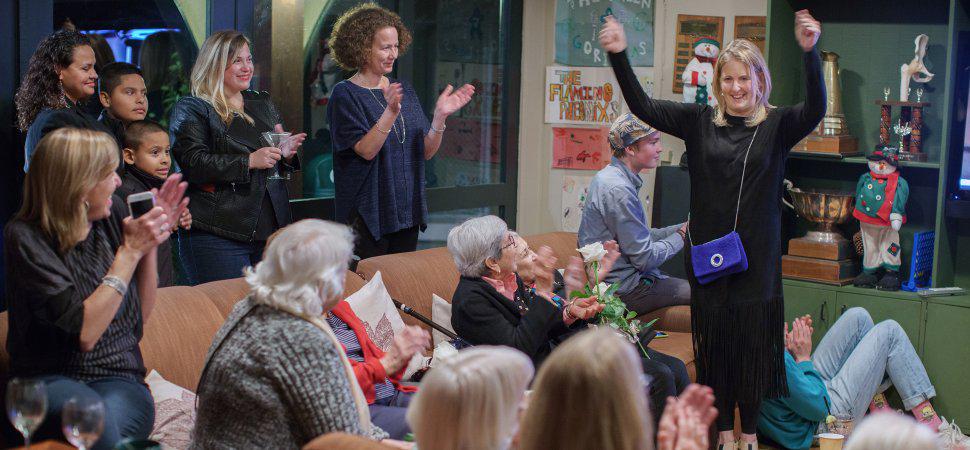This post originally appeared in Inc.
That retirement home is the Redwoods, a nonprofit senior residential community in Mill Valley where she had been spending time. About a dozen of the production facility’s residents begin arriving at the club.
Oliver started knitting handbags 10 years ago, giving them as gifts and selling them at trunk shows at friends’ parties. As of last week, that hobby is a Shark Tank–funded business—and one with a unique model.
“When I needed to increase the production, I went to the retirement home,” Oliver says Friday outside the Mill Valley Tennis Club as her husband, Mark, fusses with a red carpet runner purchased off Amazon.
A man and woman in walkers are the first to approach the red carpet. They move toward the flashes of a professional photographer as friends and family of Oliver cheer. A stream of fellow purlettes, most of them women, follow, grinning.
“I need to get your autograph,” a woman’s voice calls from the edge of the red carpet as the knitters make their way inside. “Can I get your autograph?”
There is wooting, and some laughing, and some strutting. “Estellllle,” a woman calls, drawing out the name of purlette Estelle Leopold as the 86-year-old steps off the red carpet into the tennis club.
Inside, Leopold explains how she started knitting for Sarah Oliver Handbags about 18 months ago after losing her Long Island home of more than 50 years to Hurricane Sandy and moving to Marin County to live closer to family. She was at her new home, the Redwoods, looking at the activities board. Knitting was an obvious fit—Leopold had picked up the craft as a child. “I thought it was a great idea,” she says.
It takes her a day to make a bag or—“if I stop or something or I have to go to the doctor, maybe a day and a half.”
“I hope—I hope they invest,” she says. “That would be exciting because [Oliver] works very hard.”
The show is about to start and the purlettes head over to the couches and a table (which fittingly contains plates of blue frosted shortbread sharks) in front of the television.
Ellie Leva, 89, and Fran Markowitz, 90, sit next to each other holding white roses they’d been handed as they crossed the red carpet. They start to talk about how they had become knitters but halt their chatter as the intro to the show begins. “We better watch this first,” Markowitz says earnestly.
Oliver is the third contestant. When she comes on, the purlettes hiss for the room to quiet. (Many of Oliver’s friends are chatting and loitering by the club bar.)
The sharks ask if Oliver is peddling a nonprofit. No, it’s a real business, she insists. They ask if she could scale up production. Oliver finally wins over three of the five investors through her stated mission of involving the elderly. The founder says that seniors often find themselves undervalued, and she wants to change that.
“When you have a product that touches the heart of consumers, it just blows up,” Lori Greiner says after proposing a split investment with Robert Herjavec and Kevin O’Leary at 30 percent equity. Oliver accepts the deal and the purlettes cheer. The show ends.
“Oh, it was wonderful. It’s wonderful. We’re over the moon,” says Hector Richards, 79, a Navy veteran who started knitting in eighth grade. He adds that he wasn’t surprised—he kind of knew already that she’d score support from the sharks.
He says he likes knitting for Oliver because “I like being busy.” He donates the $17 he makes per bag to a scholarship fund for Marin County high school seniors. Richards is known as a bit of a knitting machine among the purlettes because he can knit two purses a day.
It’s a low-overhead production model that yields an average gross margin of 67 percent per bag, says Oliver.
With the new investment from Shark Tank, Oliver plans to scale from tapping the current two senior communities to five over the next two years or so. The plan will be to stay with nonprofit senior homes because the communities tend to be more open to Oliver coming through and are less likely to charge her for space. She also plans to invest in promoting e-commerce sales.
“It’s really important to me that it’s not perceived as a charity,” says Oliver as the gathering thins.
